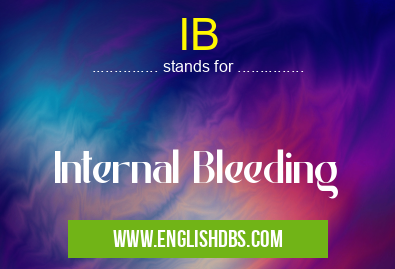What does IB mean in PHYSIOLOGY
Internal bleeding is a medical situation in which there is bleeding inside the body, often inside organs or within spaces between the muscles. This type of bleeding cannot be seen on the outside of the body and can be life-threatening unless it is treated quickly and appropriately. Internal Bleeding (IB) is an abbreviation that clinicians and laypeople use to refer to this condition.

IB meaning in Physiology in Medical
IB mostly used in an acronym Physiology in Category Medical that means Internal Bleeding
Shorthand: IB,
Full Form: Internal Bleeding
For more information of "Internal Bleeding", see the section below.
» Medical » Physiology
Essential Questions and Answers on Internal Bleeding in "MEDICAL»PHYSIOLOGY"
What are some of the symptoms of internal bleeding?
Symptoms of internal bleeding depend on where in the body the bleed is located. Common symptoms may include abdominal pain, dizziness, pale skin, rapid heart rate, chest pain, bruising without any injury visible on the skin, and passing blood in vomit or stool.
What are some common causes of internal bleeding?
Common causes of internal bleeding include trauma such as a car accident or fall, ulcers, medications like aspirin or heparin, ruptured blood vessels, liver disease or cirrhosis, cancerous growths in digestive organs such as stomach cancer or colon cancer, and coagulopathy conditions where blood clots abnormally.
How is internal bleeding diagnosed?
Diagnosis typically begins with physical exam and taking a medical history from the patient. Further tests may be ordered depending on patient's symptoms and suspected cause such as imaging tests like X-rays or CT scans; endoscopic procedures; laboratory tests which measure clotting time; angiography; and laparoscopy.
How is internal bleeding treated?
Treatment for internal bleeding depends on location and severity of bleed. It ranges from supportive care such as transfusion to more advanced treatments like surgery to stop it. In severe cases where surgery is not an option embolization can be done by blocking off blood vessels which are supplying blood to area with bleed thus helping stop it.
What are some long-term effects of internal bleeding?
Long-term effects depend on where bleed occurred but possible effects can be organ damage due to lack of oxygen causing death to affected tissue; chronic low iron levels due to loss of blood; increased risk for stroke; difficulty breathing due to build-up fluid around lungs or heart; seizures due to weak brain function caused by low oxygen levels; and infection if source of bleed was infected material getting into body space instead of just simple clotting issue.
Final Words:
Internal Bleeding (IB) can have serious consequences unless diagnosis and treatment occur quickly. Knowing the potential signs and symptoms associated with IB can help individuals recognize when further medical care should be sought out for themselves or their loved ones. With proper diagnosis and treatment outcomes for patients suffering from IB can be improved substantially.
IB also stands for: |
|
| All stands for IB |
